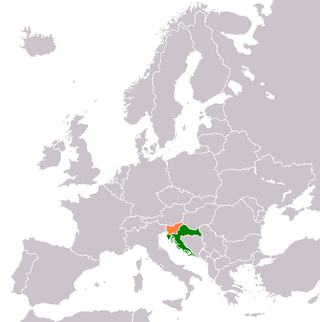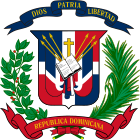
The Dominican Republic is a North American country located on the island of Hispaniola in the Greater Antilles of the Caribbean Sea in the North Atlantic Ocean. It shares a maritime border with Puerto Rico to the east and a land border with Haiti to the west, occupying the eastern five-eighths of Hispaniola which, along with Saint Martin, is one of only two islands in the Caribbean shared by two sovereign states. In the Antilles, the country is the second-largest nation by area after Cuba at 48,671 square kilometers (18,792 sq mi) and second-largest by population after Haiti with approximately 11.4 million people in 2024, of whom 3.6 million reside in the metropolitan area of Santo Domingo, the capital city.

In the history of United States foreign policy, the Roosevelt Corollary was an addition to the Monroe Doctrine articulated by President Theodore Roosevelt in his 1904 State of the Union Address, largely as a consequence of the Venezuelan crisis of 1902–1903. The corollary states that the United States could intervene in the internal affairs of Latin American countries if they committed flagrant wrongdoings that "loosened the ties of civilized society".

Since the introduction of parliamentarism in Sweden, six national referendums have been held. Legal provisions for referendums were introduced in 1922, one year after the adoption of universal suffrage. The Constitution of Sweden provides for binding referendums, but all referendums held as of 2012 have been non-binding. The latest referendum, on adopting the euro, was held on 14 September 2003.

Referendums in the United Kingdom are occasionally held at a national, regional or local level. Historically, national referendums are rare due to the long-standing principle of parliamentary sovereignty. Legally there is no constitutional requirement to hold a national referendum for any purpose or on any issue. However, the UK Parliament is free to legislate through an Act of Parliament for a referendum to be held on any question at any time.

The 1973 Northern Ireland border poll was a referendum held in Northern Ireland on 8 March 1973 on whether Northern Ireland should remain part of the United Kingdom or join with the Republic of Ireland to form a united Ireland. It was the first time that a major referendum had been held in any region of the United Kingdom. The referendum was boycotted by nationalists and resulted in a conclusive victory for remaining in the UK. On a voter turnout of 58.7 percent, 98.9 percent voted to remain in the United Kingdom, meaning the outcome among registered voters was not affected by the boycott.

The Australian republic referendum held on 6 November 1999 was a two-question referendum to amend the Constitution of Australia. The first question asked whether Australia should become a republic, under a bi-partisan appointment model where the president would be appointed by the federal parliament with a two-thirds majority. This was the model that was endorsed by the Constitutional Convention, held in Canberra in February 1998. The second question, generally deemed to be far less important politically, asked whether Australia should alter the Constitution to insert a preamble.

A four-question referendum was held in Belarus on 14 May 1995, alongside parliamentary elections. The four issues were the possibility of giving the Russian language equal status with Belarusian, whether new national symbols should be adopted, whether there should be economic integration with Russia and changes to the constitution that would allow early elections if Parliament systematically violated the constitution. According to official results, all four were approved by at least three-quarters of voters, with a turnout of 64.8%.

A referendum on the Dominican Republic–Central America Free Trade Agreement (CAFTA) was held in Costa Rica on 7 October 2007. It was originally to be held on 23 September 2007, but it was postponed on 5 June 2007 due to a court challenge. Opinion polls from April, July and August 2007 suggested that a majority of voters were in favour, while a poll from June saw a majority against. It was ultimately approved by 51.56% of voters.
A peace congress, in international relations, has at times been defined in a way that would distinguish it from a peace conference, as an ambitious forum to carry out dispute resolution in international affairs, and prevent wars. This idea was widely promoted during the nineteenth century, anticipating the international bodies that would be set up in the twentieth century with comparable aims.

A referendum on the future of the Soviet Union was held on 17 March 1991 across the Soviet Union. It was the only national referendum in the history of the Soviet Union, although it was boycotted by authorities in six of the fifteen Soviet republics.

Following the breakup of Yugoslavia in 1991, Slovenia and Croatia became independent countries. As the border between the countries had not been determined in detail prior to independence, several parts of the border were disputed, both on land and at the sea, namely in the Gulf of Piran.
A referendum on resolving the border dispute with Croatia was held in Slovenia on 6 June 2010. Voters were asked whether the dispute should be brought before an international arbitration tribunal. The results showed 51.54% of voters in favour, with a voter turnout of 42.66%.
A referendum was held in Slovakia on 23 May and 24 May 1997. Voters in Slovakia were asked four separate questions: on whether the country should join NATO, whether nuclear weapons should be allowed in Slovakia, whether foreign military bases should be allowed in Slovakia, and whether the President should be elected directly. The government left the last question off the ballot paper, leading to both referendums failing to meet the legally required turnout threshold.

The Arbitration Act 1996 is an act of the Parliament of the United Kingdom which regulates arbitration proceedings within the jurisdiction of England and Wales and Northern Ireland.

A referendum on annexation by the United States was held in the Dominican Republic on 19 February 1870. The proposal was approved by 99.93% of voters, although turnout was just 30%. However, the United States Senate rejected the annexation on 30 June 1870 with a 28–28 vote.

A referendum on leasing the Samaná Peninsula to the United States for 99 years was held in the Dominican Republic on 19 February 1873. The proposal was approved by 99.91% of voters, but was never implemented after President Buenaventura Báez was overthrown on 2 January 1874.

The Anti-Duvalier protest movement was a series of demonstrations in Haiti from 23 May 1984 to 7 February 1986 that led to the overthrow of President Jean-Claude Duvalier and the Duvalier dynasty regime and the readoption of the original flag and coat of arms of the country.

A fourteen-part referendum was held in Ecuador on 25 May 1997. Voters were asked whether they approved of the dismissal of President Abdalá Bucaram by the National Congress, the appointment of Fabián Alarcón as interim President for twelve months, the calling of a Constitutional Assembly, whether a Constitutional Assembly should be elected by direct elections or by appointment, whether spending limits should be introduced for election campaigns, whether voters should be able to modify electoral lists, whether National Assembly elections should be held alongside the first or second round of presidential elections, whether political parties that fail to cross the 5% threshold in two consecutive elections should be deregistered, whether the Supreme Electoral Tribunal (TSE) should reflect the political makeup of the National Congress, whether the National Congress should appoint managers of state-owned companies with a two-thirds majority, reforms to the justice system, allowing the Supreme Court to appoint judicial authority member, whether elected officials who commit a criminal offence should be removed from office, and whether the National Assembly should implement the 13 proposals. All eleven proposals were approved by voters.
A referendum is a direct vote in which an entire electorate is asked to either accept or reject a particular proposal. This article summarises referendum laws and practice in various countries.

The referendum on EU membership took place on 23 June 2016. Opinion polling for the United Kingdom European Union membership referendum was ongoing in the months between the announcement of a referendum and the referendum polling day. Polls on the general principle of the UK's membership of the European Union were carried out for a number of years prior to the referendum. Opinion polls of voters in general tended to show roughly equal proportions in favour of remaining and leaving. Polls of business leaders, scientists, and lawyers showed majorities in favour of remaining. Among non-British citizens in other EU member states, polling suggested that a majority were in favour of the UK remaining in the EU in principle, but that a similarly sized majority believed that if the UK were only able to remain in the EU on renegotiated terms then it should leave.















